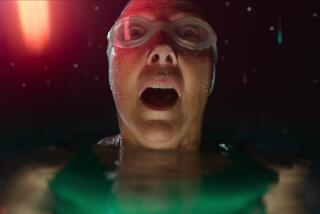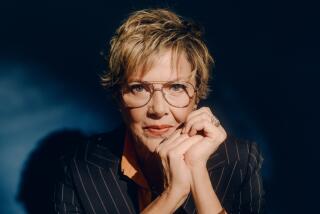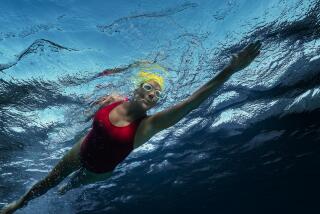Now She’s Heading in the Right Direction : Kayaking: After soggy start, Lia Rousset of Newport Beach will compete at Junior World Championship trials in Lake Placid, N.Y.
- Share via
NEWPORT BEACH — It wasn’t the most impressive way to start a career. Not unless you consider lying face down in the muck a whirlwind beginning.
But that was the position Lia Rousset found herself in three years ago when she started kayaking. Each time the Newport Beach resident set out from the dock of the Newport Aquatics Center, she did so wondering whether she would end up, splish, splash, taking a bath in the muddy waters of Upper Newport Bay.
Apparently, that was the norm.
“I was in the water all the time,” Rousset says with a smile. “I thought I was never going to be able to stay upright.”
Fast forward to the summer of ‘93:
Rousset, 15, is one of the top kayakers in the Newport Aquatic Center’s highly regarded juniors program. She will compete this weekend in the Junior World Championship trials at Lake Placid, N.Y. If Rousset meets the qualifying standard of 2 minutes 10 seconds in the 500-meter trials (she has gone 2:07 in practice), she will earn a trip to Prague, Czech Republic, for the world championships this month.
From a waterlogged start to a shot at the world championships? Not bad for someone who, three years ago, hardly knew a kayak from a Jet Ski.
Rousset was introduced to the sport by her sixth-grade teacher, Ralph Whitford, whose son, Bill, has coached many area kayakers, including a few Olympians. At the time, Rousset was involved in tennis, soccer and sailing as well as a local junior lifeguard training program. She wasn’t looking for additional pursuits.
But kayaking, despite her initial wobbliness, intrigued her.
“I like the feeling of being a propeller,” she said.
Experts say learning to kayak is a little like learning to ride a bike. Balance is key. Unlike ocean or river kayaks, which are wider, heavier and far more stable, flat-water racing kayaks can be, for the novice, a capsize waiting to happen. Because they’re only 18 inches or so across at their widest point, racing kayaks are especially unforgiving. Lean an inch too far to one side and into the drink you go.
But the rewards, Rousset says, are worth the risks. Skimming along on glassy waters in the early morning, paddling into a brilliant sunset of orange, red and gold, hearing the wind in your ears as you power through another set of 100-meter repeats . . . This is what makes the sport truly special.
Of course, the awards don’t hurt.
A year after learning to kayak, Rousset entered her first major competition--the 1991 U.S. nationals at Indianapolis. She was one of only two juniors from the Newport Aquatic Center to earn a medal--a bronze in the women’s 12-and-under 250 meters. The next year, at the nationals in Sacramento, she won six medals, including two golds in senior-level (18-and-over) events.
Last fall, as a freshman at Newport Harbor High School, Rousset ran junior varsity cross-country. She played basketball during the winter and competed in the shotput and discus in the spring. She also kept up on her kayaking. Sometimes, she paddled twice a day.
Her typical schedule:
Wake up at 5, eat a couple pieces of fruit, ride bike to 6 a.m. kayak practice. Paddle for an hour or so, take shower, ride bike to school. After classes, practice school sport, ride bike back to dock for 5 p.m. practice. Paddle for an hour, ride home, eat dinner, do homework until midnight. Go to sleep--and wake up the next morning--thinking only of kayaking.
“You get kind of used to it after awhile,” Rousset says. “But I still ask myself, ‘Why?’ The hardest part is the cold. During the winter, it’s freezing riding your bike that early in the morning.”
That’s why, last Christmas, she requested (and received) a ski mask and gloves.
Rousset grew up on Lido Island, just steps away from kayak-friendly Newport Bay. But it wasn’t until she started kayaking that she learned the sport’s basic protocol:
Never refer to kayaking as rowing. People who compete in crew row ; kayakers paddle .
Rousset, of course, has learned more than kayak terminology during the last three years. Her coach, Olympic canoeist Jim Terrell, says Rousset has progressed faster than expected--especially for someone competing against juniors two to three years older. The fact that she has been able to handle the pressure of racing in an occasional senior-division race bodes well for her self-confidence, too.
Rousset says she doesn’t have any specific goals--”Well, I hope to be a well-rounded person,” she says. Like many athletes, she would love to compete in the Olympics some day. But if that doesn’t happen, she won’t be heartbroken, she says.
It’s not as if she hasn’t already made a splash.


